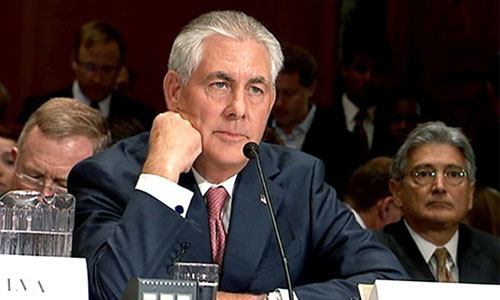

Conversely, when Maryland Rep. John Delaney introduced a revenue-neutral carbon tax bill in May 2015, none of his ExxonMobil-backed colleagues signed on. The bill would tax carbon emissions and use revenues to reduce the corporate tax rate, assist displaced coal miners and offset any increased energy costs for middle- and low-income households. Presumably ExxonMobil would approve. Neither Delaney nor the three other bill cosponsors received campaign contributions from the company.
Currying Favor with Key Members
Two committees in each chamber of Congress have jurisdiction over carbon tax-related bills. Between 2010 and 2014, ExxonMobil contributed to at least 50 percent of the members of each one.
On the House side, the company supported 24 of the 39 current members of the Ways and Means Committee and 35 of the 54 members of the Energy and Commerce Committee. Notably, 38 of the 59 ExxonMobil-funded lawmakers on the two committees are climate science deniers.
On the Senate side, ExxonMobil gave contributions to 16 of the Finance Committee’s 26 members, nine of whom reject climate science. The company also funded half of the 20 members of the Environment and Public Works Committee. Seven of the 10 are deniers.
Given the track record of ExxonMobil-funded lawmakers on climate bills and amendments, it’s unlikely that a carbon tax bill could ever get off the ground in any of these committees. And if, by some miracle, such a bill managed to attract a sizable number of cosponsors, it would still die. That’s because the chairmen of these four key committees—who have the ultimate say over a bill’s fate—have refused to schedule a vote on anything remotely related to a climate bill. And perhaps it is no coincidence that all of them have received campaign contributions from ExxonMobil.
In the House, the company supported the campaigns of Michigan Rep. Dave Camp, Wisconsin Rep. Paul Ryan and Texas Rep. Kevin Brady—consecutive chairmen of the Ways and Means Committee over the past five years—and Michigan Rep. Fred Upton, chairman of the Energy and Commerce Committee. In the Senate, it funded Utah Sen. Orrin Hatch, chairman of the Finance Committee and Oklahoma Sen. James Inhofe, who chairs the Environment and Public Works Committee.
Most of these chairmen—Ryan and Upton in the House and Hatch and Inhofe in the Senate—dispute mainstream climate science. Inhofe, perhaps the most outspoken climate science denier in Congress, has called climate change “the greatest hoax ever perpetrated on the American people.”
By donating money to these strategically placed lawmakers, ExxonMobil’s actions belie its professed support for a carbon tax. As long as they remain in place, no carbon pricing bills will ever get to the House or Senate floor, let alone to the president’s desk.
Fueling Gridlock
Of course, Congress’ refusal to address climate change can’t be blamed solely on the machinations of one company. There are a number of other fossil fuel industry players besides ExxonMobil—Koch Industries and Chevron immediately come to mind—that also spend millions to influence Congress. And then there are the ideological, theological and pseudoscientific rationales lawmakers hide behind to justify doing nothing.
Even after taking these other factors into consideration, however, ExxonMobil still bears a good deal of responsibility for the climate stalemate on Capitol Hill. After all, over the last 20 years, it has been a leading sponsor of a network of think tanks, advocacy groups and trade associations that has been peddling lies about climate science, even after the company’s own scientists warned decades ago that the consequences of global warming could be catastrophic. And the company continues to finance members of Congress who oppose taking action to address climate change.
At the conclusion of his Dec. 2 essay, Kenneth Cohen pledged that ExxonMobil “will continue to pursue effective and efficient policy options using the established scientific knowledge as the foundation for the things we advocate.” That may sound reassuring, but empty rhetoric doesn’t take us where we need to go. If ExxonMobil thinks anyone is going to believe that it is sincerely interested in combating climate change, it needs to do more than talk. If the company really supported action on climate, it would stop funding groups that spread disinformation about climate science and renewable energy. And if it really supported a carbon tax, it would stop funding lawmakers who don’t and only fund lawmakers who do.
In other words, ExxonMobil, put your money where your mouth is.
YOU MIGHT ALSO LIKE
High-Profile Trial of the ‘Heathrow 13’ Enlists Climate Scientist as Expert Witness
Second Review of EPA’s Fracking Study Urges Revisions to Major Statements in Executive Summary
Warning to Fossil Fuel Investors: Coal and LNG Markets Shrinking Due to Competition From Renewables

 233k
233k  41k
41k  Subscribe
Subscribe 